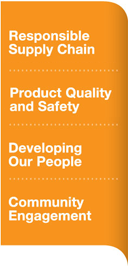|
|
|
|
|
|
|
|
|
|
|
|
|
|
|
|
|
|
|
|
|
|
|
|
|
|
|
|
|
|
|
|
|
|
|
|
|
|
|
|
|
|
|
|
|
|
|
|
|
|
|
|
|
|
|
|
|
|
|
|

|
Minimising our Environmental Footprint
|

|
|
|
|
|
|
|
|
|
|
|
|
|
|
|
|
|
|
|
|
|
|
|
|
|
| |
| |
A. Reducing our Carbon Footprint
|
| |

|
| |
| |
Increasing carbon footprint is having profound effects on the environment. The increase in greenhouse gases (GHG) in our atmosphere will ultimately lead to global warming and climate change.
At Mewah, we track an encompassing Greenhouse Gas (GHG) Emissions Matrix across all our manufacturing sites that include energy consumption, chemicals consumption, wastewater treatment and fuel consumption so as to drive better efficiency and lower our GHG footprint.
|
| |
| |
| |
| |
| |
| |
| |
| |
| |
| |
| |
| |
| |
| |
| |
| |
B. Water Management
|
| |
| |
| |
| |
| |
| |
| |
| |
| |
| |
| |
| |
| |
| |
| |
| |
We recognise water scarcity is a growing problem. According to the latest study conducted by United Nations, more than 2.8 billion people around the world live in water-stressed regions. This number is estimated to increase to 4 billion by year 2025 which is expected to be around half the world’s population.
|
| |
| |
| |
| |
| |
| |
| |
| |
|
| |
| |
| |
| |
|
| |
| |
| |
| |
| |
| |
| |
| |
| |
| |
| |
| |
| |
| |
|
| |
| |
Our action plan in assuring sustainable water supply includes:
|
| |
| |
|
| |
| |
I.
|
Consistent assessment of water-related impacts and risks across all direct operations and supply chain.
|
| |
| |
|
| |
| |
II.
|
Identify the water sources and usage – set targets to reduce fresh water use and wastewater discharge.
|
| |
| |
|
| |
| |
III.
|
Continue to improve conservation efforts (water-saving efforts) at our factories and offices.
|
| |
| |
|
| |
| |
| |
| |
| |
| |
| |
| |
| |
| |
| |
| |
| |
| |
|
| |
| |
| |
| |
| |
| |
| |
| |
| |
| |
| |
| |
| |
| |
|
| |
| |
C. Waste Management
|
| |
| |
|
| |
| |
| |
| |
| |
| |
| |
| |
| |
| |
| |
| |
| |
| |
|
| |
| |
As a responsible manufacturer, we always look to manage the waste from our production in an environmental-friendly manner.
Our action plan to assure sustainable waste management includes:
|
| |
| |
|
| |
| |
I.
|
Regular assessment of waste-related impacts and risks across all direct operations and supply chain.
|
| |
| |
|
| |
| |
| |
| |
| |
| |
| |
| |
| |
| |
| |
| |
| |
| |
|
| |
| |
II.
|
Continue to identify the 4 R’ components in managing waste:
|
| |
| |
|
| |
| |
| |
| |
| |
| |
| |
| |
| |
| |
| |
| |
| |
| |
|
| |
| |
 |
|
Focus to improve efficiency. To establish practices that are capable to reduce the amount of waste we generate to help the environment.
|
| |
| |
|
| |
| |
|
|
| |
| |
|
| |
| |

|
|
Practice to reuse materials without change whether for the original or a different application instead of throwing them away, or pass those unused materials on to others who could use them.
|
| |
| |
|
| |
| |
|
|
| |
| |
|
| |
| |

|
|
To set up ways to recover the energy values contained within the waste material.
|
| |
| |
|
| |
| |
|
|
| |
| |
|
| |
| |

|
|
Many of the things we use everyday can be recycled. Recycled items are put through a process that makes it possible to create new products out of the materials from the old ones.
|
| |
| |
|
| |
| |
| |
| |
|
| |
| |
| |
| |
|
| |
| |
|
| |
| |
| |
| |
| |
| |
| |
| |
| |
| |
| |
| |
| |
| |
|
| |
| |
| |
| |
| |
| |
| |
| |
| |
| |
| |
| |
| |

|
|
|
|
|
|
|
|
|
|
|
|
|
|
|
|
|
|
|
|
|
|
|
|
|
|
|
|
|
